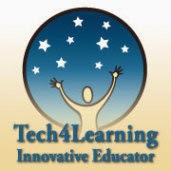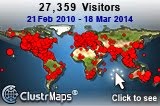Our current 4th grade graphic designer created an invitation flyer.
4th and 5th graders, working in groups of three, shared the following apps or groups of apps:
Word Work Apps (the students chose to show Free Rice and Words With Friends)
Math Apps (Quento, My Script Calculator, Khan Academy and Splash Math)
Notes and Sketchbook
Hachtavah (an app used for learning Hebrew spelling)
Using a "speed-geeking" format, each group of student experts had five minutes present to a small audience. After five minutes the audience rotated to another table. The goal was to keep the focus on how the app was used for learning.
As part of the student's preparation, each group of three was responsible for:
- a learning flyer explaining how the app is used for learning
- a "how-to" flyer, showing some basic steps for
- using the tool
- quality examples from the classroom
   The Tellegami team created this Tellegami- |
Learning Showcase from Andrea Hernandez on Vimeo.
Feedback and Reflection
The feedback on the learning showcase was tremendously positive.
Some comments from teachers who attended:
"Experiencing our students teaching the apps to their parents and to others, like me, made me want to learn more about the subject that they were teaching. It shows how much they know and how much confidence they have in their skills. It was so impressive that some of the participants were asking for more. "
"...it was really impressive . The students were well prepared, enthusiastic, respectful and joyful."
Parents loved learning from their children. One grandmother said it was the best "program" she has ever been to at the school and that she is now planning to buy an iPad for her younger grandson. It was requested that we give a repeat performance for other classes and adults.
As for me, I love seeing the students doing this kind of work that feels real and meaningful. I always have super-high expectations, so I always see room for growth and improvement. I felt that we spent a little more energy focused on the apps than on the learning. However, that was not entirely the fault of the students. The adults tended to ask a lot of technical questions which, of course, the students were happy to answer. The students are also still learning to reflect on learning, so that part is a little harder for them.
There were some really wonderful examples of partnership and teamwork with the students, although some worked better than others. Overall, the students shined. Even the shy students seemed comfortable with the format.









